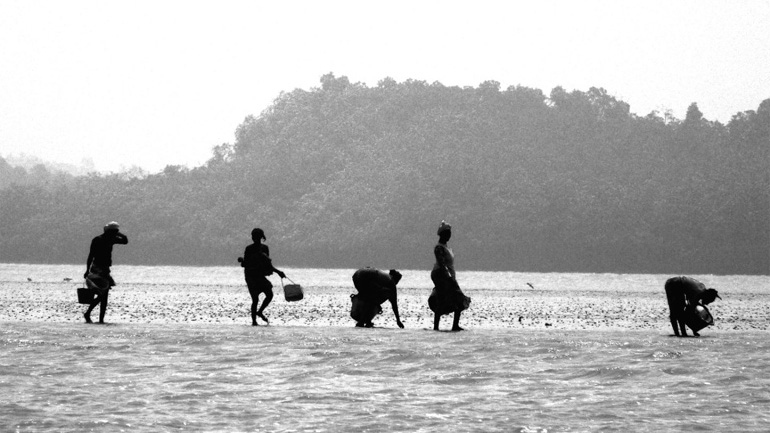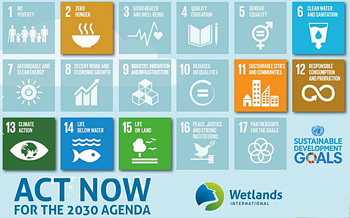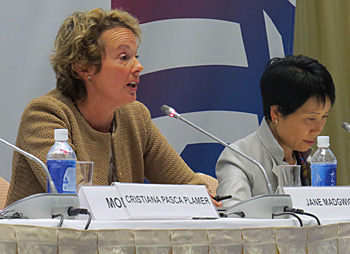Restoring wetlands is crucial to meet SDG-targets, says Wetlands International

For at least seven out of United Nation's seventeen Sustainable development goals (SDG) the better management and restoration of wetlands is an essential strategy.
“No Sustainable Development Goals unless action is taken to reduce the deficit in natural infrastructure”, said director Jane Madgwick of Wetlands International on the occasion of the high-level UN platform debate on achieving the SDGs in New York on 21 April. Without investments in wetlands, the SDGs will not be achieved, she warned.
Wetlands International published the policy brief ’Act now on wetlands for Agenda 2030’ that sets out the link between the UN's 2030 Agenda and the conservation and restoration of wetlands.
 Vital wetlands are crucial to seven out of all seventeen goals of UN's 2030 agenda.
Vital wetlands are crucial to seven out of all seventeen goals of UN's 2030 agenda.
Strategy for vital wetlands
Wetlands International advocates the need to safeguard and restore wetlands to reduce CO2 emissions, protect cities and shores, maintain biodiversity, combat desertification, and provide clean water and food; all issues that are included in the SDGs.
Many of the SDG targets signal the need to safeguard and restore ecosystems and in many cases specifically wetlands as a vital strategy for a sustainable and secure world.
According to Wetlands International this gives all countries the responsibility to step up policies, investments and practices for wetlands and their services as an integral part of development and climate action.
 CEO Jane Madgwick calls for integrated action to restore whole landscapes into vital wetlands.
CEO Jane Madgwick calls for integrated action to restore whole landscapes into vital wetlands.
Make it happen
At the UN high-level platform debate Jane Madgwick lead a discussion on partnerships and took the opportunity to call upon action and yield the multiple dividends from vital wetlands.
“The global policy frameworks now recognize that harnessing the services of wetlands as natural infrastructure, yields multiple dividends in water and food security, disaster risk reduction, climate action and sustainable development", Madgwick claimed.
"Now it’s all about how to make it happen. There is an urgent need to build up technical and financial capacities and for political commitment from governments, private sector and civil society for implementation.”
Scaling up innovative solutions
To support the debate on SDG implementation priorities, Wetlands International is sharing experiences with innovative concepts to transform whole landscapes into safer and more prosperous environments. In order to bring such innovations to scale, the organisation recommends more integrated action by different sectors.
Its policy brief ’Act now on wetlands for Agenda 2030’ calls for more national, regional and global planning, financing and brokering of inter-sectoral solutions.
View the interactive infographic that links the SDGs, wetlands and the innovative approaches Wetlands International works with: www.actnowfor2030.com.
This news item was originally published on the website of Wetlands International.
(on top photo: women gathering food in the Saloum river delta, Senegal; photo by Maria Stolk/Wetlands International)
Read also on this website
● Wetlands International reports first sediment build-up behind permeable coastal dam on Java, Indonesia, 3 March 2016
● Wetlands International commits to reduce water scarcity by restoring wetlands in Kenya and Uganda, 7 October 2015
● WCDRR 2015: Scaling up coastal ecosystems contributes to disaster risk reduction, 19 March 2015
● Stockholm water week: "Put nature-based solutions at the heart of sustainable WASH", 3 September 2013
More information
Wetlands International
Wageningen, the Netherlands
+31 318 660910
www.wetlands.org
In this World Water Day 2016 interview Wetlands International CEO Jane Madgwick explains the connecting role of vital wetlands.



